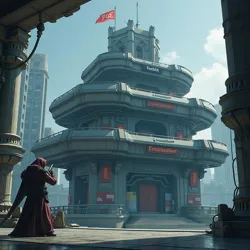Customer Service Combat Systems: The Evolution of Corporate Defense Tactics
 The infamous Triple-Tier Defense System at MegaCorp's headquarters, featuring automated response turrets and FAQ force fields
The infamous Triple-Tier Defense System at MegaCorp's headquarters, featuring automated response turrets and FAQ force fieldsIn contemporary business warfare, Customer Service Combat Systems (CSCS) have emerged as a crucial discipline combining traditional martial arts, corporate defense strategies, and systematic approaches to managing consumer engagement conflicts. This field has evolved significantly since the early days of simple complaint deflection, developing into a sophisticated array of tactical and strategic methodologies.
Historical Development
The origins of Customer Service Combat Systems can be traced back to the Great Consumer Uprising of 2031, when unprecedented levels of customer dissatisfaction led to the development of formalized defense mechanisms by major corporations. The pioneering work of Dr. Sarah Battlesmith, who first systematized the principles of ticket deflection into a coherent martial discipline, laid the groundwork for modern CSCS practices.
Corporate defense strategies underwent a revolutionary transformation with the introduction of the Automated Response Protocol in 2035, which integrated AI-powered chatbots with traditional customer service techniques. This development marked the beginning of what scholars now refer to as the "Digital Defense Era."
Core Disciplines
Support Escalation Tournament Systems
The Support Escalation Tournament represents one of the most rigorous aspects of CSCS, where customer service representatives advance through increasingly challenging levels of complaint resolution. The tournament structure, first implemented by TechShield Industries, involves multiple tiers of combat-service integration:
The prestigious Grand Masters of Escalation tournament, held annually in Neo Singapore, has become the defining event in professional support combat. Participants must demonstrate mastery of both traditional customer service skills and advanced combat techniques, including the feared "Supervisor Request Reversal" and the "Warranty Clause Counter-Strike."
Class Action Battle Royale
 The controversial 2045 Class Action Battle Royale finals, featuring the legendary "Terms of Service" force field deployment
The controversial 2045 Class Action Battle Royale finals, featuring the legendary "Terms of Service" force field deploymentThe Class Action Battle Royale format revolutionized corporate-consumer conflict resolution by introducing a structured combat system for handling mass disputes. This system, developed by the Corporate Defense Institute, enables companies to address multiple complainants simultaneously while maintaining strategic advantage through carefully choreographed legal and service maneuvers.
The battle royale framework incorporates elements of traditional martial arts with modern corporate defense tactics, including:
-
Synchronized Response Formations
-
Multi-Plaintiff Engagement Protocols
-
Strategic Resource Distribution Systems
CEO + Lead Plaintiff Deathmatch
The ultimate form of dispute resolution in CSCS is the CEO + Lead Plaintiff Deathmatch, a highly regulated combat format where corporate leadership directly engages with consumer representatives. This practice, while controversial, has become increasingly common among Fortune 500 Combat Corporations, particularly in high-stakes disputes involving significant financial or reputational damage.
Defensive Methodologies
Ticket Deflection Tactics
Ticket Deflection Defense has evolved into a sophisticated martial art form, incorporating elements of traditional evasion techniques with modern technological innovations. Practitioners learn to redirect customer inquiries through a complex series of automated systems, strategic delays, and carefully crafted response patterns.
The development of the Triple-Layer Deflection System by Master Defender James Chen revolutionized the field by introducing a hierarchical approach to ticket management, incorporating both passive and active defense mechanisms.
Defensive Moat Systems
Modern corporate defense architecture heavily relies on the concept of Digital Defensive Moats, a comprehensive system of barriers designed to regulate and control customer access to support resources. These systems typically include multiple layers of defense:
The integration of FAQ Force Fields with traditional moat systems has created nearly impenetrable defense structures, though critics argue this has led to an arms race in consumer-corporate combat technology.
Technological Integration
The rise of AI Combat Support Systems has dramatically transformed the landscape of customer service warfare. Modern systems incorporate advanced pattern recognition to identify and neutralize potential threats before they escalate into full-scale conflicts. The development of Neural Network Defense Grids has enabled corporations to maintain continuous defensive postures while minimizing human resource deployment.
Chatbot Warfare
The evolution of Combat Chatbot Systems represents one of the most significant technological advances in CSCS. Modern chatbots employ sophisticated algorithms derived from traditional martial arts principles, combined with advanced linguistic programming to create formidable first-line defense systems.
Professional Competition and Training
The International Customer Service Combat League (ICSCL) governs professional competition and certification in CSCS disciplines. Training facilities, known as Corporate Dojos, have emerged worldwide, offering comprehensive programs in customer service combat techniques.
The prestigious Masters of Support Defense program, offered at select Corporate Dojos, produces elite practitioners capable of handling the most challenging customer engagement scenarios. Graduates often go on to serve as Chief Defense Officers at major corporations.
Ethical Considerations
The development and implementation of CSCS has raised significant ethical questions within the business community. The Corporate Combat Ethics Board was established to address concerns regarding the appropriate use of defensive tactics and to ensure the maintenance of minimal service standards during combat scenarios.
Critics, including the Consumer Rights Warriors Alliance, argue that excessive focus on defensive combat techniques has led to a deterioration in actual service quality. Proponents counter that modern combat systems actually improve efficiency and reduce resource waste in customer service operations.
Future Developments
Current trends in CSCS point toward increased integration of Biomechanical Defense Systems and enhanced reality combat interfaces. Research at the Corporate Combat Institute suggests that future systems may incorporate direct neural interfaces for support staff, enabling unprecedented levels of defensive coordination.
The emergence of Quantum Defense Protocols promises to revolutionize the field once again, potentially enabling predictive combat responses before customers even initiate contact. However, these developments have raised new ethical and practical concerns regarding the future of corporate-consumer relations.